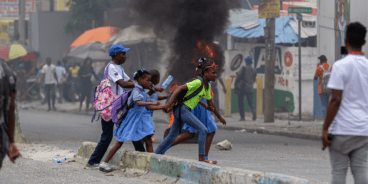
Statement on the Situation in Syria, April 2011
The Syrian government must immediately cease attacks on unarmed civilians protesting peacefully. The government’s response to protests that began in mid-March has become increasingly violent with security forces carrying out a deadly crackdown in response to the 22 April “Great Friday” demonstrations. Hundreds are dead and thousands wounded with many more arbitrarily arrested, tortured and disappeared, acts which may rise to the level of crimes against humanity, one of the four crimes that states committed themselves to protect populations from in adopting the responsibility to protect in 2005. Pursuant to this commitment, the Syrian government bears the primary responsibility to halt and avert the commission of atrocities, an obligation that it is currently failing to fulfill.
The situation is deteriorating and the risk of further atrocities is significant. Over 350 individuals have allegedly been killed since the protests began, at least 120 since Friday alone. The security forces have shown no restraint, using live fire ammunition against unarmed protesters. In the southern city of Deraa they are relying on tanks and other heavy weaponry to respond to demonstrations. Reports have emerged from that city of the shelling of residential neighborhoods and the use of snipers targeting those trying to assist the wounded. Foreign reporters have been banned from entering the country and there are reports that telephone service has been cut in certain cities making it difficult to get information out and leading to fears about what the government plans to do hidden from the attention of the world.
Syrian President Bashar al-Assad and other government officials have argued that the unrest is being instigated by “armed groups.” By characterizing unarmed civilians, including children, the elderly, medical professionals seeking to reach the wounded and those participating in funeral processions, as armed militants the threat of atrocities is dramatically heightened. In addition, recent statements have blamed a “conspiracy” of “Salafists,” adherents to the Salafi sect of Islam, for the protests and resulting violence, which suggests an attempt to stoke sectarian division and to portray the protesters as violent extremists. The government’s history of silencing opposition raises serious concerns that the regime is willing to do whatever is necessary to retain power.
On 21 April President Assad lifted the emergency law – in place since 1963 – that suspended constitutional protections including banning free assembly and granting the state expanded powers to arrest and detain individuals. While this is a positive step the fact that it was immediately replaced with a law requiring government permission for demonstrations calls into question the Assad government’s sincere commitment to reform. Since the lifting of the law protesters, opposition figures and activists continue to be targeted, arrested or disappeared. The United Nations (UN) High Commissioner for Human Rights has referred to the conduct of the government as “paper reforms followed by violent crackdowns on protesters.”
Key figures within Syria, including several members of parliament representing the city of Deraa, have recognized that violence is not an acceptable response to peaceful protests and have resigned in protest against the government’s actions. The government must uphold its responsibility to protect and ensure that security forces stop targeting unarmed civilians and act in accordance with their obligations under international law. There must also be, as Secretary General Ban Ki-Moon demanded on 22 April, “an independent, transparent and effective investigation into the killings” with those responsible held accountable.
UN member states must speak with one voice in condemning the violence and calling on the Syrian government to halt attacks on civilians. The UN Security Council must, in their 26 April meeting, address the situation and consider the imposition of targeted economic sanctions and travel bans on those individuals known to be inciting, ordering or perpetrating atrocities against civilians. The European Union should similarly enact such sanctions. The UN Human Rights Council, which Syria seeks to join, should hold an emergency session to discuss the situation and issue a strong statement making clear that such violence is unacceptable. Regional actors must add their calls for restraint.
The risks to civilians are clear. It is crucial that, in keeping with the responsibility to protect, UN member states use all available leverage to encourage the Syrian government to end the violent crackdown. Action today will save lives, prevent the situation from spinning out of control, and send a clear message to others contemplating a similar response to peaceful protests.
Related Content


11th Meeting of the Global Network of R2P Focal Points Outcome Document
